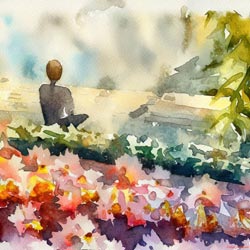 As we walk this path of mindfulness, let us contemplate the art of non-judgmental observation. In the garden of our thoughts, we often hastily label the blooms as 'good' or 'bad.' But my friends, true mindfulness encourages us to be like a gardener who merely observes the flowers without judgment. In doing so, we untangle ourselves from the thorny judgments that give power to our thoughts. Instead, we hold them gently, like fragile petals in our hands, understanding that they do not define our worth.
As we walk this path of mindfulness, let us contemplate the art of non-judgmental observation. In the garden of our thoughts, we often hastily label the blooms as 'good' or 'bad.' But my friends, true mindfulness encourages us to be like a gardener who merely observes the flowers without judgment. In doing so, we untangle ourselves from the thorny judgments that give power to our thoughts. Instead, we hold them gently, like fragile petals in our hands, understanding that they do not define our worth.
In the tender embrace of mindfulness, we encounter the notion of judgment, a whispering specter that often haunts the corridors of our thoughts. Judgment, dear traveler, is the act of evaluating, of casting a verdict, of deeming a thought as "good" or "bad." It is the stone that ripples the tranquil waters of our consciousness, disturbing the serenity within. When a negative thought emerges from the depths of our psyche, it is judgment that wields the chisel, etching "flawed" or "unworthy" upon its surface.
To be non-judgmental, then, is to adopt the sacred role of a silent witness. It is to greet each thought, irrespective of its hue, with a welcoming heart and open arms. Imagine the mind as a vast, boundless sky, and thoughts as clouds drifting by. In this expansive space, we become the sky itself, neither clutching nor pushing away the clouds. We observe them, not through the lens of right or wrong, but as unique expressions of our inner landscape. Non-judgment is the art of releasing the scales of duality that obscure our vision.
Labels, those tiny signposts in the landscape of our mind, often bear the weight of judgment. When we slap the label "bad" on a thought, we unwittingly breathe life into it, summoning its presence in our emotional realm. Conversely, the "good" label may cause attachment, an attempt to cling to fleeting joys. Mindfulness, as our trusted guide, urges us to peel away these labels, to perceive thoughts as they are—ephemeral, transient, and impartial to our verdicts.
The power of thoughts lies in their capacity to sway the pendulum of our emotions and actions. Picture a thought as a pebble dropped into a serene pond. It creates ripples that reverberate through our being. The judgment we cast upon these ripples determines whether they become gentle waves or tempestuous storms. It is through non-judgmental observation that we learn to be the tranquil pond, allowing thoughts to ripple and fade, rather than overwhelming us.
Self-compassion, the gentle balm of understanding, becomes our loyal companion in this mindful journey. When we tread the path of non-judgment, we cradle ourselves in the arms of self-compassion. It is the realization that, like all beings, we are imperfect, and our thoughts do not define our worth. In the embrace of self-compassion, we find solace and strength, knowing that even in the presence of negative thoughts, our essence remains untarnished. It is the understanding that, like the sun veiled by clouds, our inherent brilliance continues to shine beneath the transient shadows.
Why is self-compassion paramount? For it is the cornerstone upon which we build resilience and nurture emotional well-being. It is the sanctuary where we retreat when the storms of negativity rage. When we no longer define our worth by the thoughts that flicker through our minds, we rise as pillars of unwavering strength, grounded in the fertile soil of self-compassion.
This is the second this series on exploring the transformative power of mindfulness practices covering: Increased Awareness, Non-Judgmental Observation, Creating Space, Reduced Reactivity, Shifting Focus, Acceptance, Mindful Coping, and Emotional Regulation.






